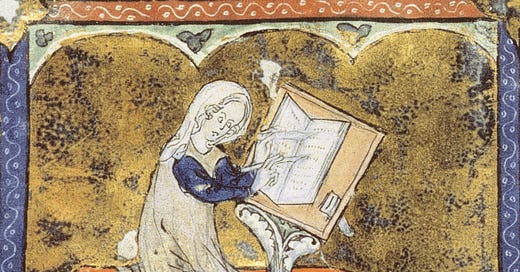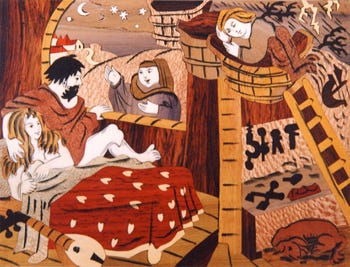This story is a failure, but later Cheever is fascinating. At this point, Cheever was experimenting, playing with the form, taking inspiration from sources as diverse as Ovid and Caravaggio. “Just Tell Me Who it Was” is a courtly love story in the tradition of Marie de France – transferred to 20th century suburbia. Will Pym, the protagonist, is a prototypical courtly love husband character - older than his wife, blissfully unaware and utterly clueless. In Courtly Love, older husbands are never the heroes. Viewing the action from the perspective of the cuckold is audacious.
Marie de France was one of the most famous writers of the Middle Ages. Her stories were lais, narrative songs played in royal courts. In one story, “Guigemar” a knight takes a magic boat to an island where he finds a woman imprisoned in a tower. They live together for years until her jealous lord's chamberlain discovers them. Separated by custom, they spend years apart until magic knots and jousts bring them together. In most lais, the jealous clueless husbands serve only as impediments to true love.
John Cheever introduces Will Pym, “a cheerful heavy man with a round face that looked exactly like pudding” as a man who clawed his way up from poverty to the upper middle class as a vice president of a rayon-blanket firm. Everything from his Dutch Colonial House to his charitable works to his young trophy wife is a shield protecting him from the insecurity of youthful poverty. Will Pym is so insecure that he writes a true romance over his life and refuses to listen to other voices, including Maria, his young wife. Doing otherwise invites the abyss.
“Beggars, old men in rags, thinly dressed men and women eating bad food in the penitential lights of a cafeteria, slums and squalid mill towns, the faces in rooming-house windows—even a hole in his daughter’s socks—could remind him of his youth and make him uneasy.” Will's hopeless infatuation takes up most of the story, and it's definitely in the context of his striving.
“Les Deux Amants” (The Two Lovers) has a king jealous of his daughter's future husband so much that he sets up a test where her suitors must carry her to the top of a hill without stopping. When the princess falls in love with a count's son, they try to cheat the test with a magic potion and starvation. Only he never takes the potion, assuming that his love is strong enough. He carries his beloved to the top of the hill but dies. She dies too. Their love is that strong.
Will Pym loves his wife so much that he talks about her everywhere – jury duty, vacations, business trips. At dinner parties, he stops to announce that she has a funny story. Like a courtly love hero, he loves her without reservation. Their friends are inevitably disappointed in her. She's not nearly as adorable if you're not smitten. Will Pym is like a teenager in the middle of a first crush. What he doesn't know, he fills in with his romantic ideal. Unlike most infatuated men, he actually married his crush.
Unfortunately, Will Pym is too infatuated to ever listen to Maria, much less consider her feelings. Early, they take a long walk in the woods. Will Pym is having a romantic walk culminating in a tree where Will carves their initials. Maria is putting up with it. She's tired and hungry and cold. When he carves their initials, she's not thinking “oh how romantic. I've got a great husband.” She's thinking about what she's going to make for supper. Will is not romantic enough to do the housework.
The Apple Blossom Fete is the most dramatic event in this couple's marriage. They are supposed to dress like French History characters. Maria wears tights and a corset. Will tries to forbid her from going with that outfit, but she cries and he gives in. He wears chain mail and spends the entire night unable to get close to her as she dances with other men. The age difference gets creepy as he outright treats her like a misbehaving daughter.
When she comes home crying because she's dissatisfied with her life and a night of dancing with strange men doesn't relieve the disappointment, Will doesn't ask why. He automatically assumes that she got pinched and groped because she didn't listen to him. He even offers to forgive her. She closes the door on him and he sleeps in the guest room.
To fully appreciate “The Miller's Tale”, one should read courtly love stories and know Chaucer's target. The husband is too clueless to even know that he's being cuckolded. The lovers are pathetic. The wife responds to their declarations of love with mockery and sex. The ending where the scorned lover tries to brand her with an iron and gets her fuckbuddy instead is an ending suited for audiences slightly bored with the usual tropes.
The title comes when Shady Hill gossips are talking about clothing left in the parking lot. Even though Will Pym saw the woman who went out with another man, he suspects his wife. He doesn't just suspect. He's certain that she's cheating on him. When he finally asks her something, he asks her whom she slept with and won't leave her alone.
There's no indication that Maria is cheating on him. He is just playing cuckold.
Finally he “figures out” that Henry Bulstrode is the other man. So he punches him in the face. He doesn't ask. He doesn't confront. He punches. Then he goes away satisfied that he can take more “romantic walks” with his wife and buy her stuff.
This story fails because John Cheever depicts Will Pym as so deluded that the reader can't sympathize. Cheever is having fun parodying the obsessive love so popular in medieval and modern literature. Sadly, without a relatable protagonist, it never rises above the level of a joke.
Read an article on the Feminist Aspects of Marie de France.
If enough of you get paid subscriptions or hire me to edit your novels, I won’t have to link to my gofundme. Sadly, I’m still broke, so here’s my gofundme. Help if you can.
Gary Oldman plays a sad drunk John Cheever in Parthenope. You can rent or buy it for streaming from Amazon.






